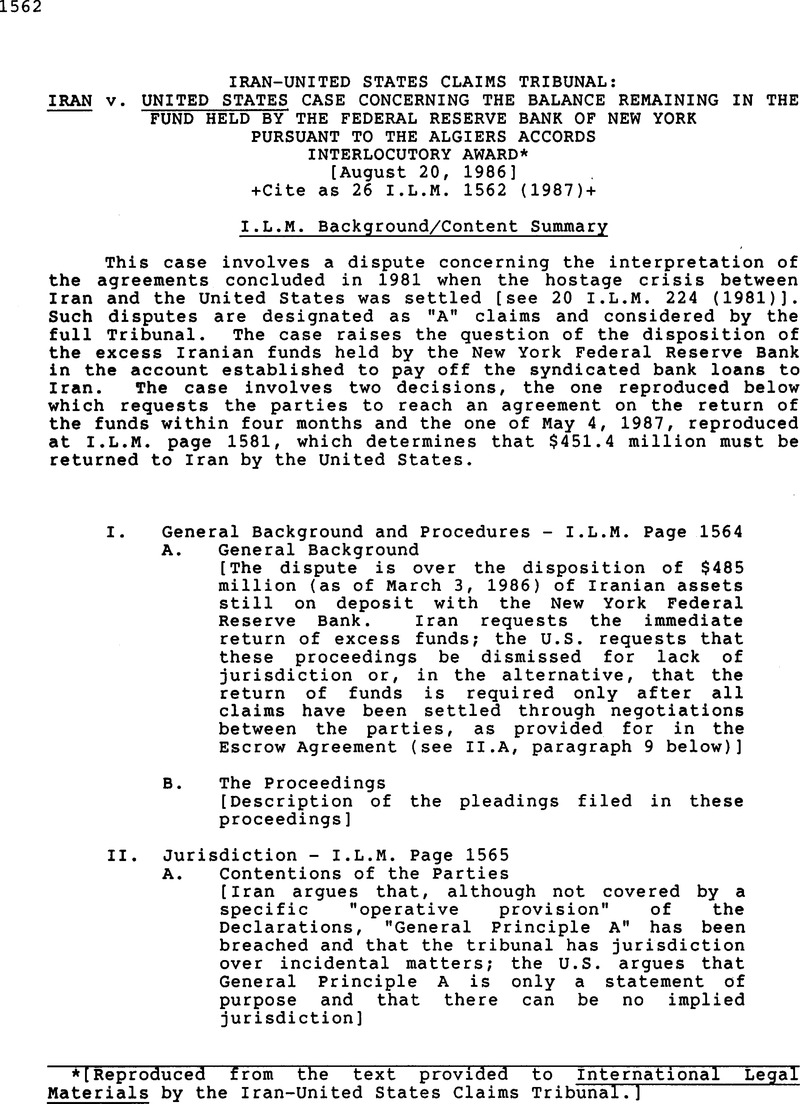No CrossRef data available.
Article contents
Iran-United States Claims Tribunal: Iran v. United States Case Concerning the Balance Remaining in the Fund Held by the Federal Reserve Bank of New York Pursuant to the Algiers Accords Interlocutory Award*
Published online by Cambridge University Press: 18 May 2017
Abstract

- Type
- Judicial and Similar Proceedings
- Information
- Copyright
- Copyright © American Society of International Law 1987
Footnotes
Reproduced from the text provided to International Legal Materials by the Iran-United States Claims Tribunal.
References
1 In the Algiers Accords the term “Dollar Account No.1”only refers to the account at the Bank of England,into which the funds out of the Iranian assets were transferred by the United States pursuant to Paragraphs 4 and 5 of the Declaration of the Government of the Democratic and Popular Republic of Algeria(“the General Declaration“). Later,Dollar Account No.1 became a term used by the Parties to describe the $3.667 billion transferred from the Bank of England to the Federal Reserve Bank,and it will be used hereinafter in this sens.
1 Dissenting Opinion of Judges Holtzmann,Aldrich and Brower, Award No. ITL 63-A15(I:G)-FT (20 August 1986). Judge Aldrich and Judge Holtzmann continue to maintain the views set forth in their Dissenting Opinion. Judge Salans did not take part in the earlier phase of this Case which resulted in the Interlocutory Awar.
2 See,e.g., Fiedler, Unilateral Acts in International Law, 7 Encyclopedia of Public International Law 517-22 (1984); 1 P.Guggenheim, Traitéde Droit international public, 279-82 (2d ed.1967); G.Schwarzenberger, International Law as Applied by International Courts and Tribunals 548-54 (3d ed. 1957); M.Hudson,The Permanent Court of International Justice; 1920-1942,at 633-34 (1943);E. Suy, Les actes juridiques unilaté raux en Droit international public,127-32, 146-52 (1962)..
1 Article IV, paragraph 1, of the Claims Settlement Declaration provides that “[a]ll decisions and awards of the Tribunal shall be final and binding.“.
2 Article 32, paragraph 2, of the Tribunal Rules provides that “[t]he award shall be made in writing and shall be final and binding on the parties.” Iran acknowledges that in this context the term “parties”refers to “arbitrating parties”,i.e.,the particular claimant and respondent in any case.See Tribunal Rules,Introduction and Definitions,paragraph 3(c.
3 Convention on the Settlement of Investment Disputes Between States and Nationals of Other States, Mar.18,1965,17 U.S.T.1270, T.I.A.S.No.6090,575 U.N.T.S.159(1966). Pursuant to the legislation implementing the ICSID Convention in the United States, pecuniary obligations imposed by an award rendered pursuant to the Convention “ shall be enforced and shall be given the same full faith and credit as if the award were a final judgment of a court of general jurisdiction of one of the several States. ”22 U.S.C.S1650.
4 United Nations Convention on the Recognition and Enforcement of Foreign Arbitral Awards, June 10,1958,21 U.S.T.2517, T.I.A.S.No.6997, 330 U.N.T.S. 3,(effective Dec. 29,1970.
5 Vienna Convention on the Law of Treaties, May 23,1969, U.N.Doc.A/CONF.39/27,8 I.L.M.679(1969.




